Raising Water Consciousness through
World’s Biggest Photo Exhibition and
Largest collection of Photo Stories on Water
Photo Stories | Drinking Water
Men and Drinking Water Procurement: Sharing the Burden
Nandita Singh and Om Prakash Singh
16 November, 2016
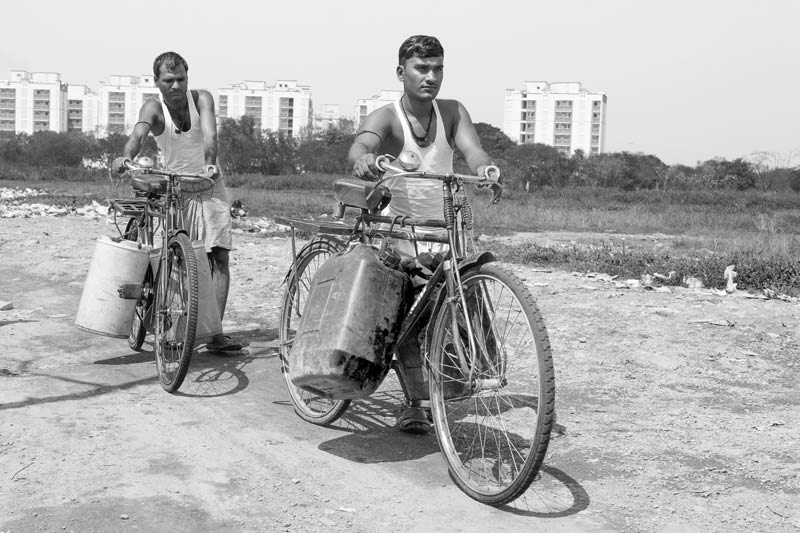
Women are undisputedly recognized as domestic water managers in rural as well as urban India, being primarily the ones responsible for procuring and managing drinking water at home. Little emphasis is placed on the question of what role and responsibility is shared by men in this regard. It is further assumed that women undertake all the hardships in procuring water for home, while men are perhaps no more than users. This photo story makes a departure by exploring how men contribute to this essential domestic chore and identifying the essential challenges met by them in procuring drinking water, which may be used by themselves or their families. The story reveals that men may travel long distances for fetching drinking water when sources nearby are absent or fail to provide potable water. They may face long anxious waiting hours at community water supply points or battle through great rush and queue for procuring a container of water. They may actually ease the task of women by transporting water home in bulk, carrying large containers on the head, shoulders or on bicycles, motorcycles or carts. They may also support women by shouldering the responsibility at odd hours like late in the night. Sometimes they participate jointly with women where teamwork is necessary or help fetching water from contexts that may be seemingly difficult or risky for women. The various challenges shouldered by men in procuring drinking water have significant after effects for themselves and their families. Long waiting hours and water supply during the day may kill men’s productive time, thereby ultimately affecting family incomes. Carrying heavy loads of water manually may lead to physical injuries while transporting these on bicycle or motorcycle may pose risk of accidents, finally resulting in injuries. Jostling through rush with water loads can lead to slipping and getting injured. Apart from additional medical bills, injuries in turn imply negative impacts on family incomes as men are often the main bread winners. Thus, while sharing the responsibility of drinking water procurement by men may facilitate everyone’s human right to water at home, its negative impacts may thwart the enjoyment of this and many other human rights in several ways. This story presents some glimpses of the different ways in which men in rural and urban India shoulder the burden of drinking water procurement. The title photo depicts men transporting drinking water in large containers precariously balanced on bicycles along a dirt road in Mumbai, Maharashtra. The water is procured from a safe source located far away from the informal colony where they reside.
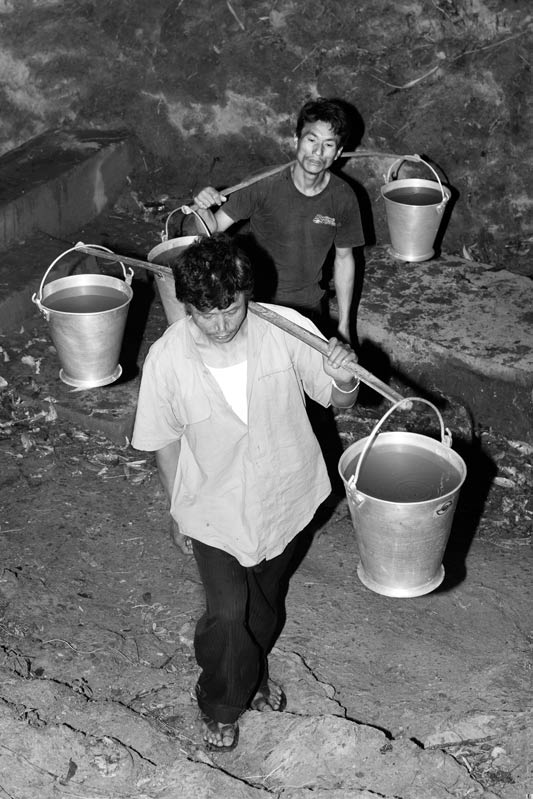
Carrying water buckets up the hill to their village at dawn in district Zunheboto, Nagaland
Villages in Nagaland are commonly perched on hilltops which expose the residents to acute water crisis soon after the monsoon season. As the dry season progresses, water sources nearer the village, most commonly in the form of springs, dry up and they have to search for sources further and further away. While women may fetch water from distant sources during the day, some sources yield water only early morning after recharging for several hours in the night. In such instances, men cooperate in water procurement, carrying water manually. A common mode of carriage is hanging buckets on two ends of a bamboo rod, which is a risky venture as they often have to traverse steep, slippery and hilly paths across deep jungles.
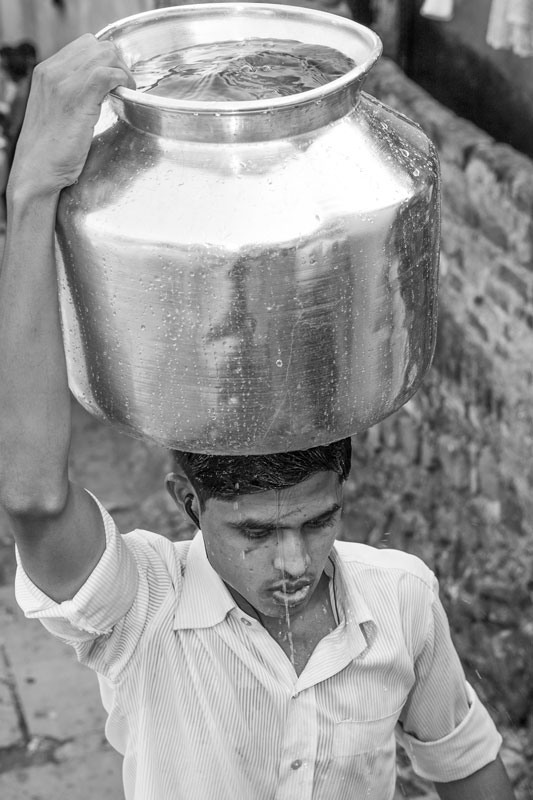
Drenched while hurriedly carrying a water pot on the head in Mumbai, Maharashtra
At public water points or group connections, the supply duration is short but takers are many, requiring brisk action by the collectors. They carry heavy containers as quickly as possible and may even get drenched with the water spilling down.
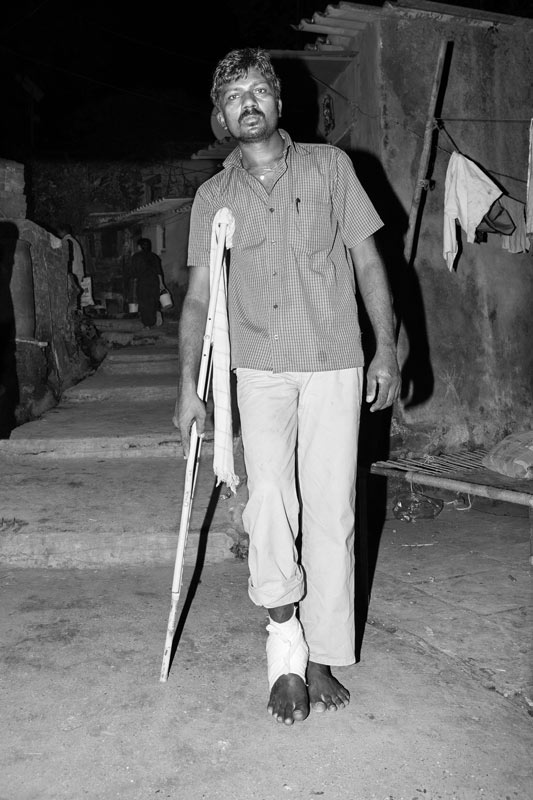
Victim of water hauling in Mumbai, Maharashtra
The brisk action of water collection spills water on the ground, making it slippery. Further, the ground may be uneven or stairs may need to be climbed with water loads. Also, the timing of water supply may be late in the night. These circumstances imply great physical risks of injury for the water carrying individuals. This man broke his ankle while briskly climbing the stairs in the darkness of the night in his hilly informal colony of residence with a headload of water.
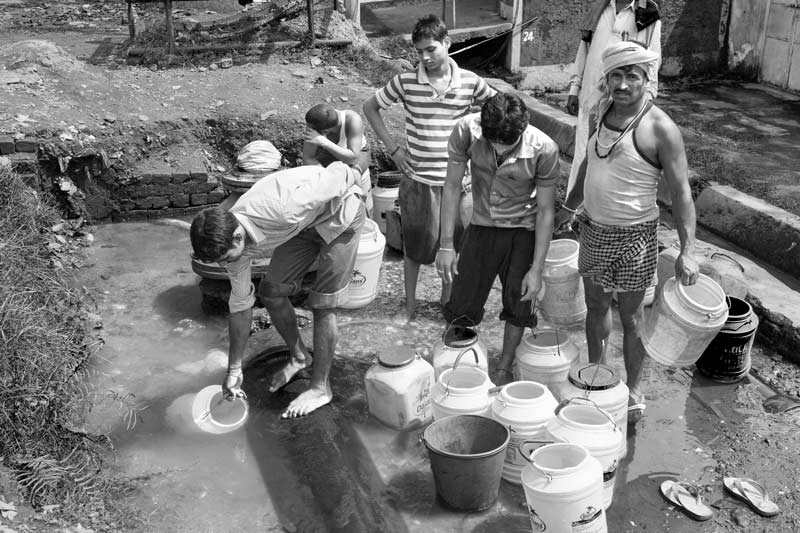
Procuring drinking water from a ditch filled by leakage from a pipeline serving a neighboring colony in the outskirts of Dhanbad city, Jharkhand
Dhanbad city – the coal capital of India – is increasingly facing water crisis. The groundwater table is fast getting depleted while water supply lines in the city are limited. This exposes many settlements in the city, especially the informal ones, to water crisis. As a result, residents in these colonies have to involve a lot of time and effort in search of drinking water sources far and wide. This point is one such instance where every afternoon men coming from different places are seen busy collecting drinking water for themselves and their families. The extent of microbial contamination in this water is unquestionable.
.jpg)
Using an unconventional water source for avoiding rush and queue at the public point in an informal colony in Mumbai, Maharashtra
This pipeline carries water for supply to industries and nearby colonies in Mumbai, but ironically, the people living in the informal settlement around the pipeline lack access to this source. Further, the only public water point in the settlement has many dependents. Consequently, a number of residents living nearby make use of the leakage from the pipeline as their water source. As a result of the leakage, the area around the pipeline is generally muddy and slippery, posing health risks to those who engage in utilizing the leakage. Considering these difficulties, men assist in water procurement from this location, and also make use of the water on-site for personal purposes.
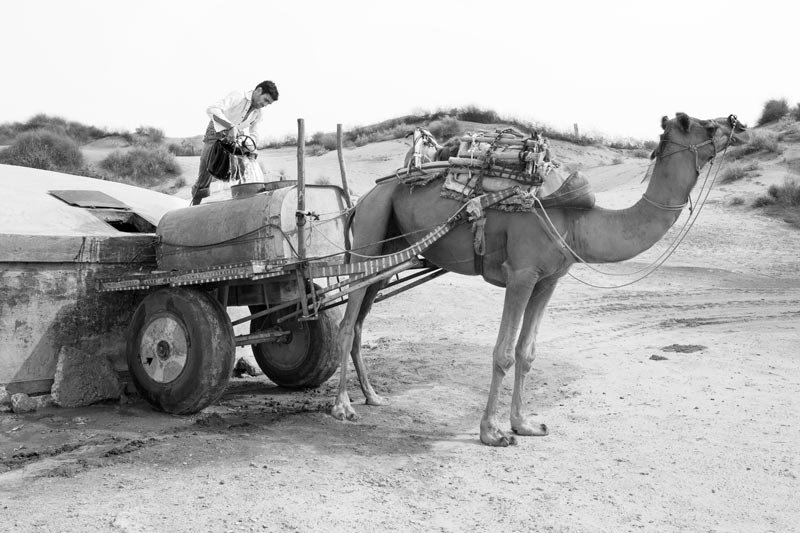
Transporting water for filling up an underground tank (kundi) at home in Bikaner district, Rajasthan
In Rajasthan, drinking water sources are often located on the village outskirts which make the task of water procurement somewhat cumbersome for women. To reduce the burden, many households possess underground tanks called 'kundi', the capacity of which is often large in the range of 3,000-10,000 liters. These large tanks cannot obviously be filled by women by simply carrying water in pots and pitchers. Instead men help in this task through bulk transportation of water on camel carts or tractors. In this case, water is being lifted from a community tank served by the Indira Gandhi Canal supply scheme.
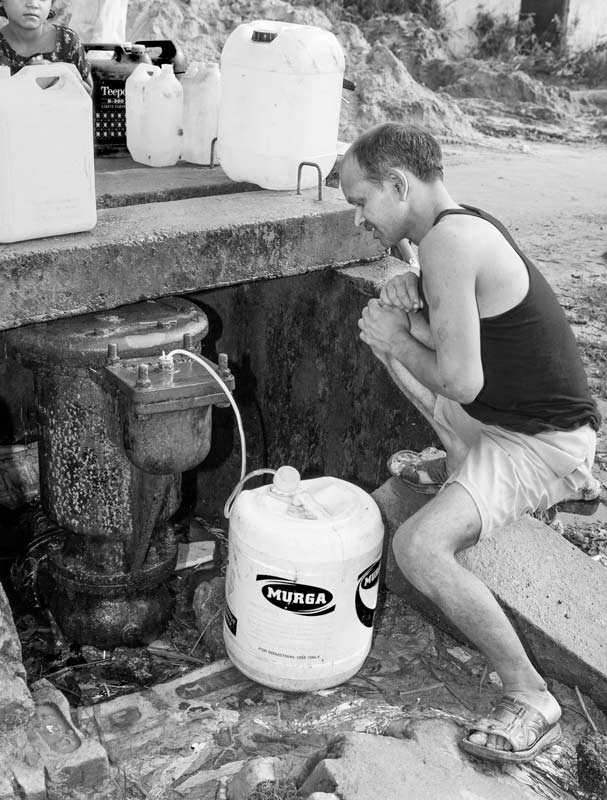
Pilfering some cans of drinking water for home use from a valve on the main pipeline in South East district, National Capital Territory of Delhi
In many informal urban settlements, safe water sources are lacking and people have to literally search for closest alternatives outside. This man shoulders the responsibility of procuring drinking water for his family every morning by inserting a pipe into a valve connection on a mainline passing close by the settlement. The pipeline carries treated water for supply in a neighboring colony.
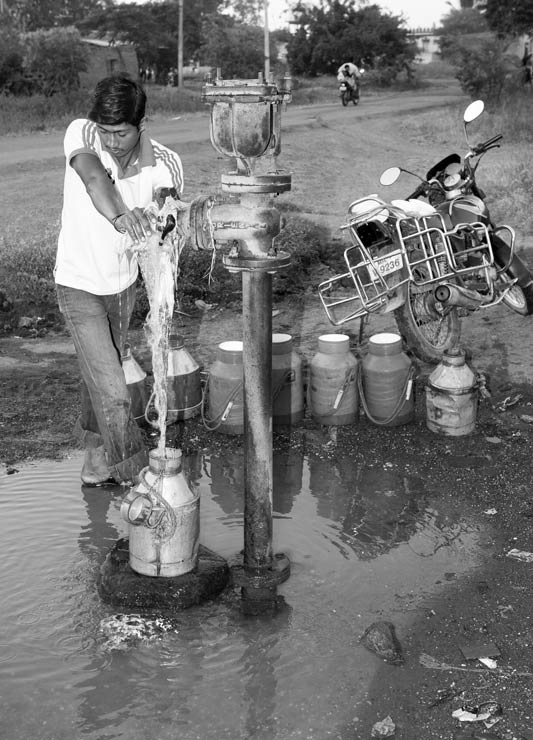
Filling containers at a valve on a water mainline in Ahmednagar district, Maharashtra
This milk vendor transports milk for sale in the city everyday, but on his return journey utilizes the opportunity by filling his milk containers with water for home. The source that he utilizes is leakage from a valve installed on a main water pipeline which carries water to the adjoining city. There is absence of sweet and safe water in his village.
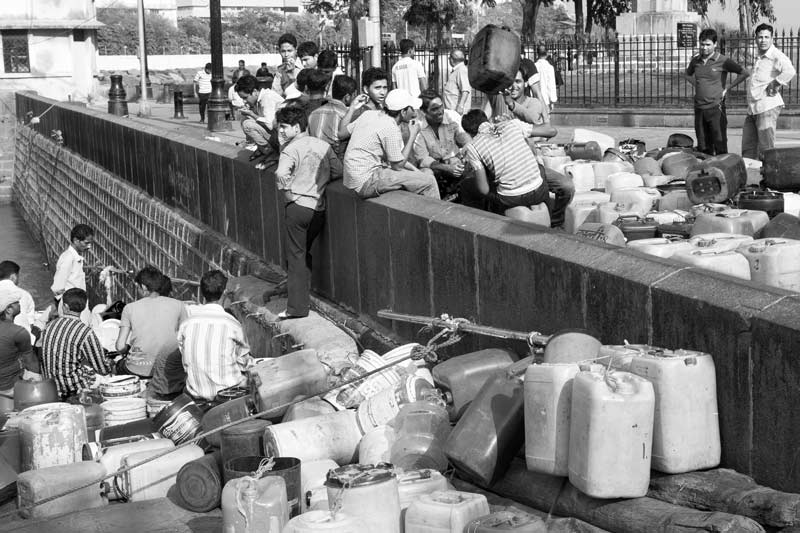
Boatmen queuing up for collecting potable water in Mumbai, Maharashtra
Sometimes men are responsible for procuring drinking water for themselves at work. Near the seashore at Gateway of India in Mumbai, those owning and working on boats need to procure sweet water for drinking for themselves and their passengers. The water source for this purpose is limited, with a few water supply points near the shore but hundreds of containers to fill within a limited period of time. Consequently, getting drinking water becomes a struggle for the boatmen, forcing them to wait in long queues or sometimes even getting into conflicts since this is the only source of potable water for them.
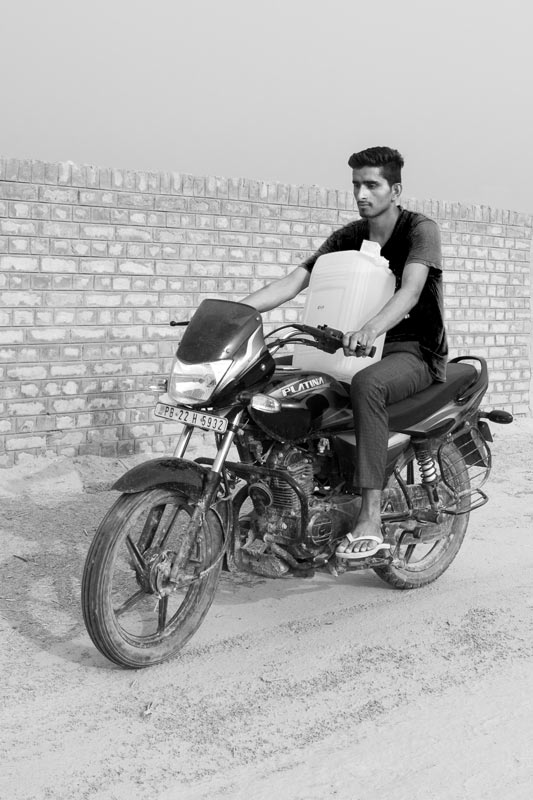
Transporting sweet water for the family in Fazilka district, Punjab
Salinity of groundwater is a major problem in Malwa region of Punjab, as a result of which the handpumps or other groundwater-based sources at home can be used for only non-drinking purposes. In this village in Fazilka district, sweet water for drinking is available at shallow handpumps installed adjacent to agricultural canals that carry river water. Since these sweet water sources are distant from the village settlement, men assist in transporting the water home.
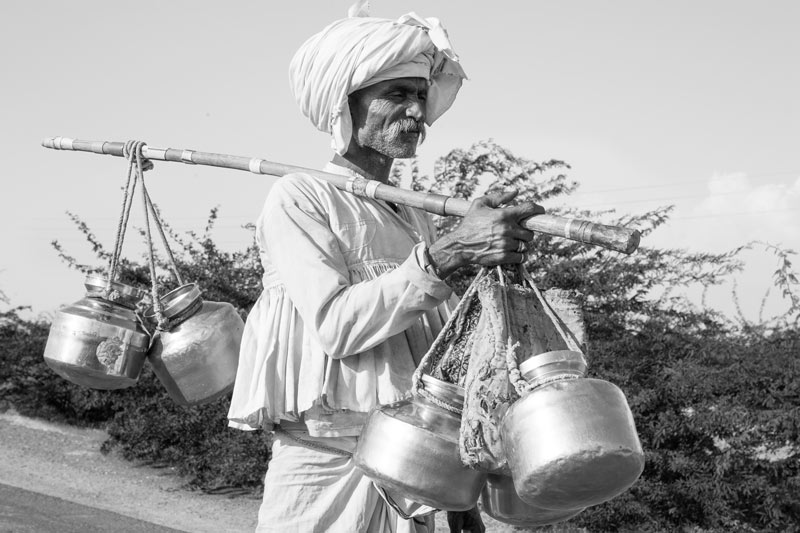
A shepherd proceeding to fill water for his long day in the pastures in Kutch district, Gujarat
Animal herding and agriculture are often male occupations that require the person to remain outside in the sun the whole day. In the arid and semi-arid regions, such as Gujarat or Rajasthan, for quenching thirst while at work, finding a drinking water source in the pastures and agricultural fields may be difficult. Consequently, an animal herder or farmer must carry his own drinking water at work but this in itself may be challenging since safe and sweet water sources in these areas are generally few.
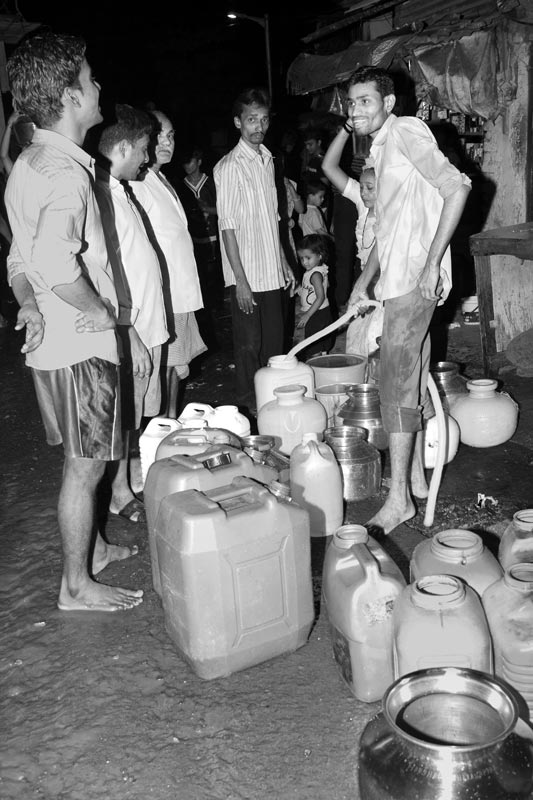
Helping with filling up drinking water containers at a group connection late in the night in Mumbai, Maharashtra
This group connection is located in an informal colony in Mumbai, where the only water supply timing is late in the night. Further, the process of filling up the containers is time-consuming since the water pressure is low and the duration is short. Consequently, water procurement becomes a family activity where women, children and men have to jointly shoulder the responsibility. This may become much demanding for men since they have to engage in this cumbersome task after a long working day. Here the men are assisting in water procurement around 10.30 in the night.
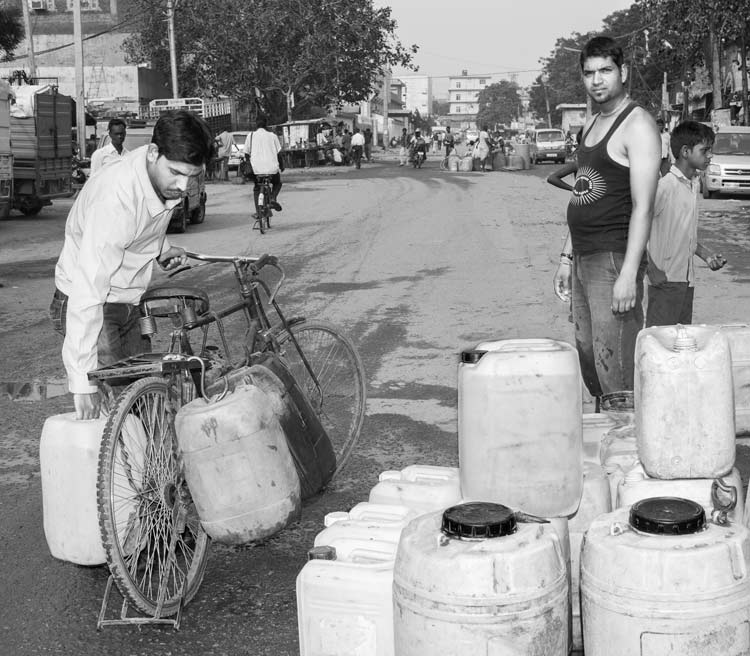
Transporting jerrycans home after filling them with water from a tanker in an unsettled colony in South East district, National Capital Territory of Delhi
In Delhi, many unsettled colonies are supplied with drinking water through tankers that halt on the main motorable roads. Men assist in procuring drinking water from these tankers by climbing atop and inserting pipes, filling the water in large containers. Finally, they are also responsible for transporting the big loads back home, either on bicycles or manually across busy motorable roads.
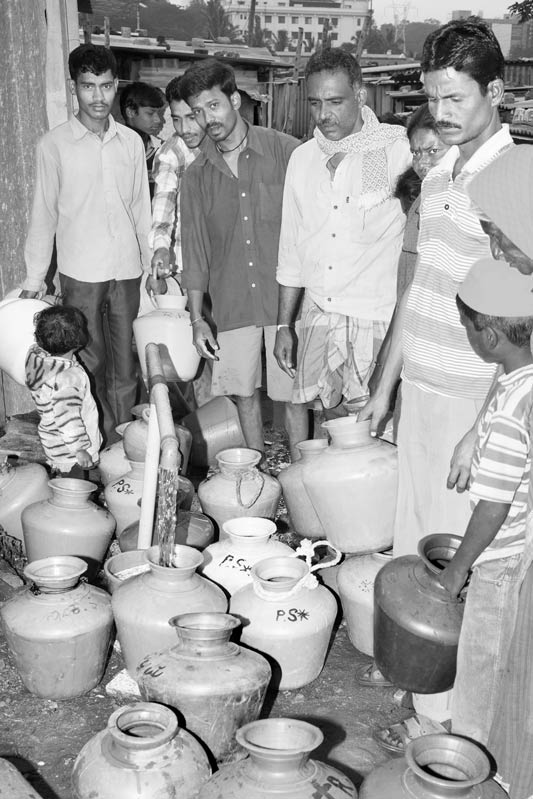
Queuing up for water at a community borewell in Bengaluru city, Karnataka
This community borewell, located in an unsettled colony in Bengaluru, is the only source of water for the people residing here. Supply hours at this water point are rather inconvenient early in the morning around five o'clock. Also, the duration is rather limited; causing long queues and sometimes also rush. In many families, under these circumstances, men assist by queuing and procuring drinking water for the family before leaving for work. This is obviously much demanding since it requires waking up very early in the morning in order to ensure one's turn at the water point, often leading to incomplete sleep.
The drinking water domain is often projected as women's arena in India and elsewhere in the developing world, but this photo story illustrates how rural as well as urban men are also actively engaged in this domain alongside women. They share the responsibility in various ways – for example by helping fetch water at odd hours, or by jostling through rush at busy public water supply points, or procuring water from spots that may be comparatively difficult or risky for women to access. They also help transport bigger loads of water manually or through different modes of transport. Many a times, they take the responsibility of procuring drinking water for themselves at work. However, sharing of this important domestic responsibility by men may not always help facilitate enjoyment of the human right to water or the other human rights by themselves and their families. The reason is the hardships faced by men and the heavy cost they may have to pay for prioritizing water over health and work. If the human rights of men and their families is to be facilitated and an upward trajectory for societal development is to be ensured, the micro-level challenges faced by them in fulfilling the basic drinking water needs must be identified and effective solutions implemented.